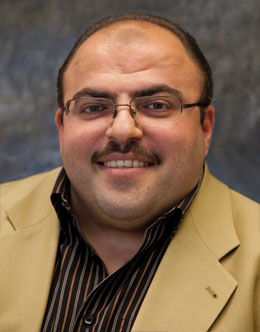Volume 30 · Number 4 · Summer 2013
The young and the inventive: Nael El-Farra

Nael El-Farra
(courtesy photo)
Nael El-Farra, professor of chemical engineering
Education: Ph.D., UCLA, 2004; B.S., UCLA, 1998
Specialty: Process systems engineering
Nael El-Farra is fascinated by the underlying behaviors of chemical processes and chemical plants. Using sophisticated mathematical modeling, he studies the design of wireless sensor technology to monitor and control reactions deep inside industrial plants. He has worked to make those sensors more durable and less likely to lose data when their signals wax and wane.
The applications include: keeping energy grids up and running despite a surge in one part of the system; making it easier to create distributive energy systems that are able to use both traditional energies and also the intermittent presence of electricity generated from renewables such as solar and wind energy; keeping chemical plants safe when components fail; preventing nuclear power plants from melting down during emergencies such as that following the earthquake and tsunami in Japan in 2011, and so on.
“He’s trying to find what he calls ‘robust control systems,’” explains colleague Ahmet Palazoglu, “that would still operate optimally in the presence of such failures,” through advanced software systems that can analyze and respond to unfolding events in parts of industrial facilities inaccessible to human beings.
Bob Powell, a chemical engineering professor and chair of the UC Academic Senate, said El-Farra is “really becoming a leader in the area of process control. His mathematical abilities are really outstanding. Nael is showing how to get much more information, and much more ability to control processes, from a lot of things that are already going on.”
As industry adopts these process control methods, they will save money and their facilities will become more stable and safer.
“It has implications not just for chemical plants but for any large-scale system — like the power grid,” El-Farra said. “Given the history of process control over the years, and how technology makes its way into industry, you can see this in the next 10 to 15 years.”
Back to The Young and the Inventive
